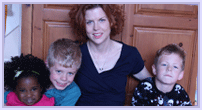Book Review: Cribsheet: A Data-Driven Guide to Better, More Relaxed Parenting, from Birth to Preschool
 Cribsheet: A Data-Driven Guide to Better, More Relaxed Parenting, from Birth to Preschool by Emily Oster
Cribsheet: A Data-Driven Guide to Better, More Relaxed Parenting, from Birth to Preschool by Emily Oster
Publisher: Penguin Press
Publication Date: April 23, 2019
My rating: 5 of 5 stars
Publisher’s Description:
With Expecting Better, award-winning economist Emily Oster spotted a need in the pregnancy market for advice that gave women the information they needed to make the best decision for their own pregnancies. By digging into the data, Oster found that much of the conventional pregnancy wisdom was wrong. In Cribsheet, she now tackles an even greater challenge: decision-making in the early years of parenting.
As any new parent knows, there is an abundance of often-conflicting advice hurled at you from doctors, family, friends, and strangers on the internet. From the earliest days, parents get the message that they must make certain choices around feeding, sleep, and schedule or all will be lost. There’s a rule—or three—for everything. But the benefits of these choices can be overstated, and the trade-offs can be profound. How do you make your own best decision?
Armed with the data, Oster finds that the conventional wisdom doesn’t always hold up. She debunks myths around breastfeeding (not a panacea), sleep training (not so bad!), potty training (wait until they’re ready or possibly bribe with M&Ms), language acquisition (early talkers aren’t necessarily geniuses), and many other topics. She also shows parents how to think through freighted questions like if and how to go back to work, how to think about toddler discipline, and how to have a relationship and parent at the same time.
Economics is the science of decision-making, and Cribsheet is a thinking parent’s guide to the chaos and frequent misinformation of the early years. Emily Oster is a trained expert—and mom of two—who can empower us to make better, less fraught decisions—and stay sane in the years before preschool.
Emily Oster uses the same data-centered approach in Cribsheet that she did in Expecting Better. (You can read my review of that here.) That’s why I loved Expecting Better so I knew I’d love Cribsheet too. Oster wrote Expecting Better after she had her first child and drew on her own experience of pregnancy for that book. She would present the data and explain why she made the choice she did but was never judgmental about it. The choice was ultimately left up to the reader. Cribsheet is the same, only Oster wrote it after the birth of her second child. She knows from personal experience that all children are different and what works for one may not work for another – even if they have the same parents.
Cribsheet covers the most heated topics related to a baby’s first year – sleep training, breast vs. bottle, vaccinations, working vs. staying home, etc. The section on toddlers includes walking, talking, potty training, discipline, education and more. Like in Expecting Better, she presents the various approaches to each topic and then her analysis of the available data, without judgment. My oldest child is 16 years old and my youngest is 18 months old. A lot has changed in 16 years. One example is that it’s now recommended that children sleep in the parents’ bedroom for their first year. This blew me away! My older kids were in their own room within weeks of birth and this was pretty much standard at the time. After reading Oster’s section on sleep, I understood why the recommendation had been put into place and was able to decide how long I thought it was appropriate for my new baby to sleep in my bedroom given the available data.
I hope that Oster continues to write books as her children grow. I’ll be first in line for all of them!




